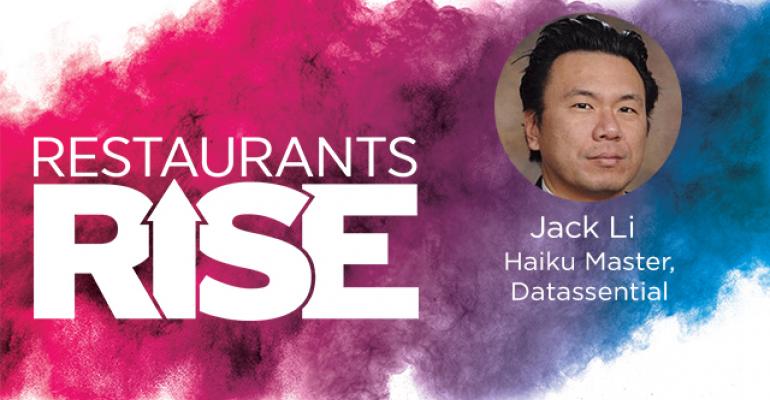Once shelter-at-home orders are lifted, consumers rank dining out as one of the top three things they look forward to doing, along with socializing with friends and visiting family.
It’s a testament to the strong emotional connections consumers have with restaurants, which have been clobbered during the COVID-19 pandemic, Jack Li, founder of menu research firm Datassential, said on day three of the inaugural Restaurants Rise Live digital conference.
“Eating at a restaurant is right up there with seeing family,” Li said, citing recent consumer data by Datassential. “That's remarkable. The mental benefit and the psychological benefit we get from restaurants and this feeling of normalcy that we derive from those sit-down restaurant experiences cannot be overstated.”
Restaurants Rise is a four-day digital conference organized by Nation’s Restaurant News and Restaurant Hospitality. The free event is providing insights and business solutions for restaurant leaders navigating the COVID-19 environment.
Li’s Wednesday morning keynote speech, titled “The future has been accelerated: A look at what will work and why,” gave restaurant leaders a glimpse inside a consumer’s psyche.
He explained their pandemic fears and gave tips on how restaurants can meet their expectations as states across the nation enter various stages of reopening businesses.
“Safety beats everything right now,” Li said.
At the onset of the pandemic, the coronavirus drew widespread fear because the virus is invisible and highly contagious.
People felt like they were “entering and walking through a minefield,” he said.
But as restrictions ease across the U.S., Li said consumers are entering a new phase, where they feel like they have more control over their safety.

“We've gone from a place of helplessness with fear to a place of caution,” Li said.
Li said restaurants need to figure out what makes consumers feel like they have control over their destiny.
Safety, he said, is a must filter for a consumer. After that, consumers begin to sort and prioritize based on what makes them feel safe, Li said.
According to Datassential, the types of venues that make guests feel safe are restaurants with outdoor seating, quick-service chains (due to contactless drive-thru), fast-casual chains, and businesses that provide prepared foods or grocery deli.
What venues rank lowest, in terms of perceived safety? Cruise ships, restaurants with play areas for kids, buffet-style restaurants, and entertainment venues such as concerts and sporting events.
“Most consumers don't feel that even after shelter [in place] is lifted [that] this is going to be a safe way of getting food,” Li said.
Li’s advice: Adapt.
“Rethink in very dramatic terms how you serve food,” he said.

While safety is important, Li notes that consumers are not racing through meals when returning to dine-in. As dining rooms reopen, consumers are turning to restaurants for relaxation.
Li advised restaurant owners to keep that in mind when serving guests. There’s pent-up demand to dine out and consumers want to take their time with the experience. That’s good news for restaurants operating at limited capacity.
Diners are staying longer and spending more money.
“So don't feel the need to rush your customer through your restaurant,” Li said. “Allow them to do that because they're not just looking for food. They're looking for that experience with relaxation being paramount.”
Li also spoke about pre- and post-pandemic menu trends.
Consumers sought comfort foods during the pandemic. But as they return to restaurants, they are looking for things they crave and couldn’t cook at home including Mexican food, seafood and Asian food.
While many restaurant companies have been working with limited menus during the pandemic, Li recommended restaurants return to menu innovation and to resist resorting to discounting to lure consumers — a strategy that hurt some restaurants during the Great Recession.
“You want to keep your innovation pipeline going. You can use price promotions in the short term to stimulate activity,” he said. “[But] use it sparingly right now to stimulate some demand. You don't want to rely on it as your long-term strategy.”
For our most up-to-date coverage, visit the coronavirus homepage.
Contact Nancy Luna at [email protected]
Follow her on Twitter: @fastfoodmaven
This is part of special coverage of the Restaurants Rise digital summit taking place online June 2-5, powered by Nation’s Restaurant News and Restaurant Hospitality. Register for live sessions or on-demand replays at RestaurantsRise.com.
Title sponsors for Restaurants Rise include DoorDash, National Pork Board and True Aussie Beef & Lamb. A portion of proceeds from this event will help support the Restaurant Employee Relief Fund from the National Restaurant Association Educational Foundation.





